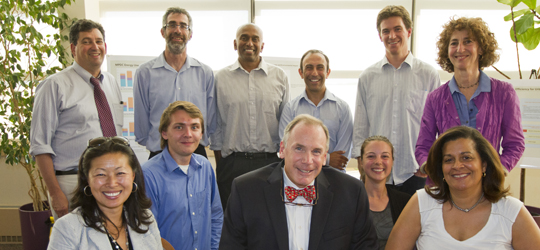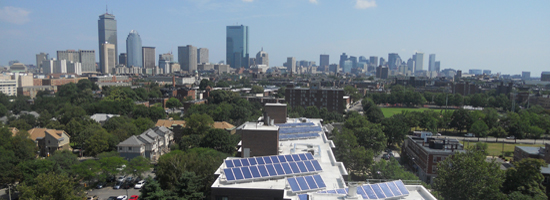Enhancing Energy Efficiency for Urban Housing – The Madison Park Project
Project Manager: Marta Marello
With more than 40% of U.S. energy consumption and carbon emissions coming from buildings, increasing building energy efficiency is key to urban dwelling quality of life and a sustainable energy future. Utilities in public housing cost the U.S. approximately $1 billion/year. Increased energy efficiency would not only reduce these costs but also have the beneficial environmental effect of lowering greenhouse gas emissions.
The Enhancing Energy Efficiency for Urban Housing research project is a collaboration between Boston University’s Sustainable Neighborhoods Lab and the Madison Park Development Corporation (MPDC) located in Roxbury, Mass. In 2014, the Frederick S. Pardee Center for the Study of the Longer-Range Future became the administrative home of this project.
The goal of the study is to identify the factors that drive energy use and determine effective programs that can achieve greater energy efficiency, while considering residents’ comfort levels and desired energy-use needs. The team conducting this research spans engineering, econometrics, business, and social science disciplines.
The study is being conducted in four buildings at MPDC covering 426 apartments, where nearly 20% of MDPC operating costs (approximately $1 million) are energy expenses. While MPDC pays for the fuel-use in all buildings, in two buildings, tenants are responsible for their electric bills, thus providing interesting insight into economic factors.
Our thesis is that energy efficiency can be improved through appropriately designed programs, incentives, and technology but one must consider the needs, behavior, and budget of both residents and property managers. To address these objectives, a multi-disciplinary approach is used to:
- develop a baseline understanding of current energy consumption and efficiency;
- develop an understanding of the impact of behavior on energy consumption obtained in part through engaging community residents;
- evaluate the impact of energy efficient capital investments; and,
- conduct statistical and engineering analysis to understand factors determining energy use.
To date, the project actively involved over 100 residents while providing summer jobs for five local high school students.
News
- March 18, 2015– Marta Marello and Robert Kaufmann featured in Wells Fargo story,
“Teaming up to improve energy efficiency with clean technology.” - September 17, 2014– Members of the project participated in a Pardee House Seminar, “The Future of Urban Housing: Enhancing Energy Efficiency.” A video of the event is available here.
- November 5, 2013–BU Today, “BU Profs Take Energy Conservation from Lecture Hall to Real Life.”
- August 20, 2013–Members of the project and the research sponsor, Wells Fargo, celebrated the culmination of the summer phase of the project.
Boston University Team
- Michael Gevelber, Associate Professor, Mechanical Engineering, Boston University
- Robert Kaufmann, Professor, Earth & Environment, Boston University
- Nalin Kulatilaka, Professor of Finance, School of Management, Boston University
- Marta Marello, Project Manager, Frederick S. Pardee Center for the Study of the Longer-Range Future, Boston University
- Enrique Silva, Senior Research Associate, Lincoln Institute of Land Policy

Partners
The Madison Park Development Corporation
IBM
NSTAR
Wells Fargo
